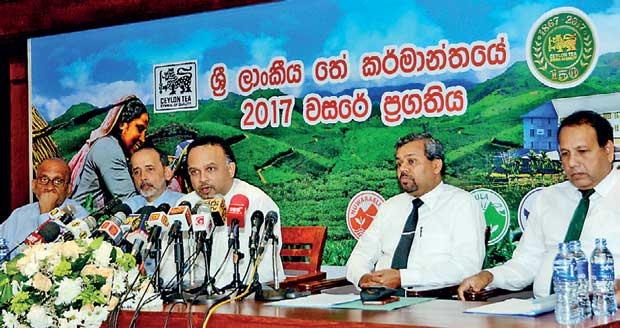Reply To:
Name - Reply Comment

From left: Colombo Tea Traders’ Association Chairman Anselm Perera, Sri Lanka Tea Board Chairman Rohan Pethiyagoda, Plantation Industries Minister Navin Dissanayake, Plantation Industries Ministry Secretary J.A. Ranjith and Sri Lanka Tea Board Director General Anura Siriwardena
Pic by Pradeep Pathirana
By Chandeepa Wettasinghe
The Plantation Industries Ministry will set up an agency to monitor the 20 regional plantation companies (RPCs) on their tea production operations and financial affairs.
“We have to get the processes right. Especially in the RPCs, we have to get some monitoring system in place,” Plantation Industries Minister Navin Dissanayake said yesterday during a media briefing.
He said that the total production and yields in RPCs have fallen, although the RPCs have invested heavily in their operations.
“The golden shareholder is the government and the people. We feel that after 25 years, there are holes in the monitoring by the government,” he said.
The RPCs were leased to private parties for 50 years in 1992 after the state ran into difficulties in managing the plantations, which were nationalized in 1972.
Dissanayake said that the visiting agents of the ministry have evaluated the RPCs over the past one and a half years and categorized them into A, B and C categories based on their performance.
“The ones that are falling behind we have to monitor and also take stern action against them,” he said.
In addition, some RPCs have been moving money earned through plantations into other group activities, which has to be monitored, Dissanayake said.
The replanting efforts of RPCs and the cleanliness and quality of the tea being produced will also be monitored.
“We are putting the minimum guidelines for the RPCs where the RPCs and the government agree on a framework to protect the assets,” he said.
Dissanayake said that there have been issues with regard to the cleanliness, quality and chemical residues in tea across the tea supply chain and the wrongdoers will be strictly punished unlike in the past.
“I haven’t taken hard decisions. May be that is my fault. Now I will take hard decisions,” he said.
The tea industry had been in troubled waters in 2015 and 2016 and the industry only witnessed a rebound in 2017.
Glyphosate ban hurting potential tea earnings
The glyphosate ban has cut into the potential earnings of the tea industry, the Sri Lanka Tea Board chairman said.
“If not for the ban, we would have increased the production by 5 to 7 percent and earned Rs.10 billion to Rs.15 billion more in revenue. It’s a very expensive policy decision for Sri Lanka,” Rohan Pethiyagoda said.
Dissanayake added that some tea planters are using chemicals such as MPCA and Hextar, which are much more dangerous than glyphosate. The accepted residue levels for MCPA are 100 times tighter in countries like Japan compared to glyphosate, Pethiyagoda said.
“So, we can’t use the safest weed killer,” he said.
“These are the issues that come up when there are unconventional policies,” Dissanayake added.
Glyphosate was banned in 2015 by the Finance Ministry under the orders of President Maithripala Sirisena, who was influenced on the decision by a Buddhist monk cum politician, based on one study conducted by a local scientist that glyphosate causes the chronic kidney disease of unknown etymology in the dry zone.
Many other scientists have said that there is no such conclusive scientific evidence.
Rs.6bn tea promo campaign in 3 months
A Rs.6 billion tea promotional campaign will be rolled out soon to target 12 key markets, Dissanayake said.
“The tea marketing campaign will be ready in three months,” he said.
The funds collected for this purpose will be used in its entirety and the cabinet approval has been received, with the creative tender being awarded to Phoenix Ogilvy and the media planning, scheduling and buying awarded to Dentsu Grant, the minister said.
The mix of advertising will be in favour of digital and social media, he added.
“We found that television ads don’t give a lasting memory,” Dissanayake said, explaining the switch to digital media.
The top countries targeted will include Russia, the USA, UAE, Japan, China, Iran and Germany, while the secondary targets will include Turkey, Saudi Arabia, the UK, Australia and India.
The campaign will run for two years and in seven languages, targeting the relevant countries.
He said that the campaign was delayed due to concerns over whether the funds were being used in the most optimal manner.